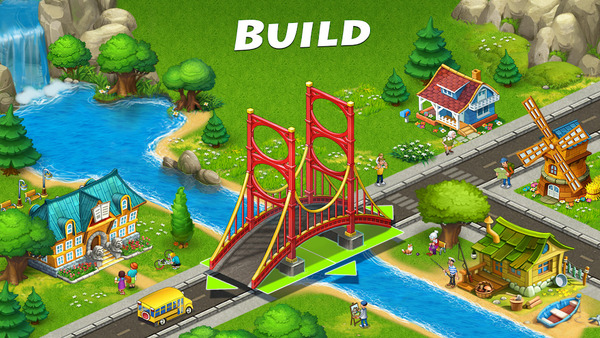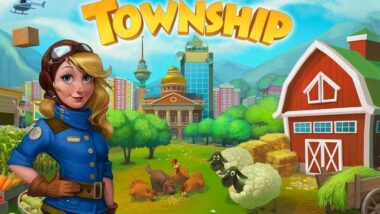Township is a unique blend of city-building and farming simulation where your primary objective is to manage resources, grow your town, and participate in events to maximize progress. In this in-depth guide, we’ll explore key strategies to help you navigate the game’s various challenges, from efficient resource management to town expansion and long-term planning. This “how-to” guide will cover the most effective ways to improve your gameplay experience and ensure your town flourishes.
Introduction
Township offers a rewarding blend of farming, resource management, and city-building. The complexity of the game grows as you advance through levels, requiring thoughtful planning and strategy. While the game starts off easy, succeeding long-term requires balancing different aspects of your town, such as resource production, population management, and event participation. This guide will walk you through practical tips on how to streamline your progress in Township, ensuring that your town grows both in size and efficiency.
1. Establishing a Strong Foundation: Early Game Strategy
In the early stages of Township, it’s crucial to set a strong foundation for future growth. Avoid rushing through levels without considering the long-term effects of your actions.
H3: Focus on Balanced Production
In the beginning, you’ll need to carefully manage your crop production and factory outputs. Crops like wheat and corn are quick to grow and are used in multiple production chains, so keep a steady supply of these essential resources.
H3: Avoid Expanding Too Quickly
It can be tempting to buy new land as soon as it’s available, but make sure you have enough resources and infrastructure to support expansion. Balance your town’s growth with your ability to produce and manage necessary resources.
2. Crop Management: Maximizing Efficiency
Farming is a vital part of Township, and managing your crops efficiently will ensure that you’re always prepared to fulfill orders and grow your town.
H3: Plan for Long and Short Crop Growth Cycles
Different crops take varying amounts of time to grow. Plan for crops that take longer to harvest by planting them before logging off or while completing other tasks. Quick-growing crops, like wheat, should be planted when you’re actively playing to keep production continuous.
H3: Crop Diversity
As you unlock new factories, diversify the types of crops you grow to supply multiple production lines. Focusing too heavily on one type of crop can result in shortages that bottleneck production and slow progress.
3. Efficient Use of Factories
Factories convert raw materials into goods that are used to complete orders and tasks. Efficiently managing your factories is critical to maintaining a steady cash flow.
H3: Queue Production When Possible
When a factory has a production queue, make sure it’s always running. Even if you don’t need the items right away, having extra inventory ensures you’re prepared for incoming orders. Long production items should be queued during your downtime to maximize efficiency.
H3: Factory Upgrades
As you progress, upgrading your factories becomes crucial. Upgrades reduce production time and increase the factory’s output. Prioritize upgrading factories that produce high-demand items first.
4. Managing the Barn and Storage Space
The barn in Township is where all your resources and items are stored. Managing barn space is one of the more challenging aspects of the game since it fills up quickly.
H3: Prioritize Barn Expansions
Barn expansion should be one of your top priorities, especially as your town grows. Train deliveries provide materials for expanding your barn, so ensure that you’re constantly completing train orders.
H3: Managing Inventory Wisely
Only keep what’s necessary in your barn. Sell or use excess items to prevent overcrowding. Avoid producing too many goods that will sit unused and take up valuable space.
5. Expanding Your Town Strategically
Expansion in Township requires coins and materials, so it’s important to have a clear strategy before investing in new land or buildings.
H3: Focus on Community Buildings
Community buildings are essential for increasing your population cap, allowing you to build more houses and grow your town. Without enough community buildings, you won’t be able to progress as quickly, so prioritize these structures when expanding.
H3: Plan Land Expansions Carefully
Land expansions unlock new areas for factories, decorations, and farming, but they also come at a cost. Expand your land only when you have enough coins and building materials to fully utilize the new space.
6. Managing Population Growth
Population management is another important aspect of Township. The number of citizens you have directly affects the town’s productivity and unlocks new buildings.
H3: Houses vs. Community Buildings
As you build more houses, you’ll need more community buildings to increase your population cap. Balance the construction of houses with community buildings to maintain steady growth.
H3: Optimizing Building Placement
Place houses and community buildings strategically to maximize your space. As your town expands, you’ll want to ensure that buildings are placed efficiently to avoid clutter and maximize productivity.
7. Maximizing Coin Generation
Coins are essential for expanding your town and upgrading buildings. There are several ways to maximize your coin generation in Township.
H3: Complete High-Value Orders
Some helicopter, plane, and train orders offer higher rewards. Focus on completing these high-value orders whenever possible to maximize your coin earnings.
H3: Diversify Revenue Streams
In addition to fulfilling orders, you can generate income through farming, factory production, and selling surplus goods. By diversifying your town’s revenue streams, you’ll ensure that coins are constantly flowing in.
8. Participation in Events and Competitions
Township regularly features events and competitions that provide opportunities for additional rewards. Participating in these events is a great way to accelerate progress and earn valuable resources.
H3: Township Events
Township events usually involve mini-games or themed challenges. Participating in these events gives you the chance to earn coins, cash, and special decorations. Always check for upcoming events and plan your production accordingly.
H3: Regattas and Team Competitions
If you’re part of a co-op, you’ll have the opportunity to participate in regattas, which are weekly competitions. Completing tasks in regattas helps your team earn points, leading to collective rewards that benefit everyone in your co-op.
9. Effective Use of Township Cash
Township cash is the premium currency in the game, used to speed up tasks and purchase rare items. Managing your cash wisely is essential for long-term success.
H3: Save Cash for Important Purchases
Avoid spending cash on speeding up basic tasks. Instead, save it for more important purchases such as expanding your barn, acquiring rare materials, or upgrading factories.
H3: Earning Free Township Cash
You can earn Township cash for free by completing certain achievements or watching in-game advertisements. Take advantage of these opportunities to build up your cash reserves without spending real money.
10. Long-Term Planning: The Zoo and Beyond
In addition to building your town, Township also includes a zoo feature where players can build animal enclosures and complete collections.
H3: The Zoo as a Secondary Income Source
While the zoo may not be essential in the early game, it becomes a useful secondary source of income later on. Completing zoo orders provides extra coins and materials that can be reinvested into your town’s growth.
H3: Planning for Future Expansions
As you progress in Township, future expansions and buildings will become available. Always keep long-term goals in mind, such as unlocking higher-level factories or expanding your town’s borders, to ensure sustained growth.
Conclusion
Mastering Township requires a careful balance of managing resources, expanding strategically, and participating in events. From building and upgrading factories to optimizing your barn’s storage, every decision you make affects the overall success of your town. By following the tips and strategies outlined in this guide, you’ll be well on your way to creating a thriving town that can withstand the challenges and complexity of the game.


